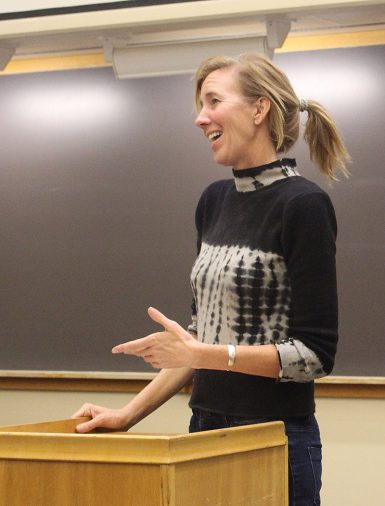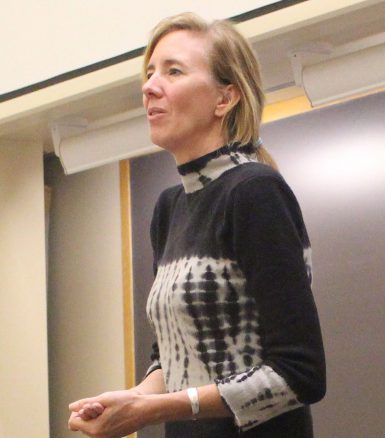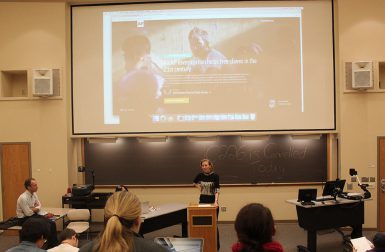McDowell describes investigative reporting on fishing industry

Pulitzer Prize-winning reporter Robin McDowell explained the investigative techniques she and her Associated Press colleagues employed to get their story about slave labor in Thailand’s fishing industry.
McDowell, the school’s Roy W. Howard Lecturer, talked to professor of practice Joe Coleman’s class as well as other attendees in the Radio-TV Building Monday. She and three other AP reporters won the Pulitzer Prize for Public Service medal for their work, “Seafood from Slaves.”
McDowell said helping readers relate their own lives to the story is critical for any good story. She explained how her team approached this investigation.
“Everyone knew that there were huge abuses going on in Southeast Asia,” McDowell said. Because it was such a well-known fact, McDowell explained, no one seemed to care. To make the story matter to people, McDowell and her colleagues showed how slaves supplied seafood for U.S. markets.
“It was important because it made people think about how this fish is ending up on the dinner table,” she said. “It showed the human cost.”
At first, nailing down the “who” and “what” was a challenge, she said. She spoke to former slaves who had been free for several years, so they weren’t timely interviewees. The team found it difficult to find boats with current slaves because only a few boat captains were abducting people. Overall, it took about a year before McDowell heard of the Indonesian island where corrupt captains dumped their slaves.

“It was this remote island about half way between Australia and Papua New Guinea,” she recalled. “I remember there were lots of kangaroos and hundreds of slaves. And there was one side of the island that had this big factory and the other side was the village.”
McDowell stayed in the village, looking at that factory and wanting to know what went on there. All of the men on the island lived a life underground. Most of them were Burmese who had been trafficked but carried fake Thai documents to avoid discovery. Those slaves who escaped and came to this island weren’t free. Because there were bounty hunters looking for escapees, the men married Indonesians to become legal. Even then, they had to live secret lives to avoid discovery.
Fellow reporter Esther Htusan joined McDowell on the island. Htusan is Burmese, so immediately the men took more of an interest in the women. It had been so long since these men had seen a Burmese woman, and they immediately opened up to the reporters and started telling their stories.
“No one ever asked to have their identity kept out of the story,” McDowell said. “It was amazing, it was as if they were dead already.”
Nonetheless, while they were reporting and taking video, McDowell and Htusan interviewed the slaves twice – once face to face, exposing their identity, and once in private.
“We didn’t want to put them in even more danger of their abusive captains,” she explained.
After reporting on the slaves, the two reporters tracked the slave ships from the island to Thailand, then followed to the fish distribution points. Several of the companies were small, but the reporters managed to tie some businesses to American supermarkets like Kroger.
In the end, their reporting directly contributed to the freeing of more than 2,000 slaves on that island. After news spread about these Thai companies, the Thai government set up a rescue plan.

“It felt good that day,” McDowell said when asked how it felt to be part of something like that. “But the point was not to free 2,000 guys; 2,000 guys is nothing. We wanted to impact the companies that were purchasing this fish.”
McDowell warned this practice is ongoing. There still are thousands of slaves in this industry. The Thai and U.S. governments may have cut ties with those three the reporters discovered, but they still are doing business with hundreds more.
“The outcome shifted focus from the bigger problem,” McDowell said.
Now that this project is finished, McDowell said she is interested in writing even more stories that will make people care. That is one of the best things about her job, she said McDowell. Being a journalist gives you the ability to “pick things you care about. You have the ability to put the spotlight on it and make people care.”
“McDowell showed that every story has a purpose,” said Alyson Malinger, a senior studying journalism. “It’s inspirational that a story can have such an immediate impact. It shows words do mean something in society.”
More:

